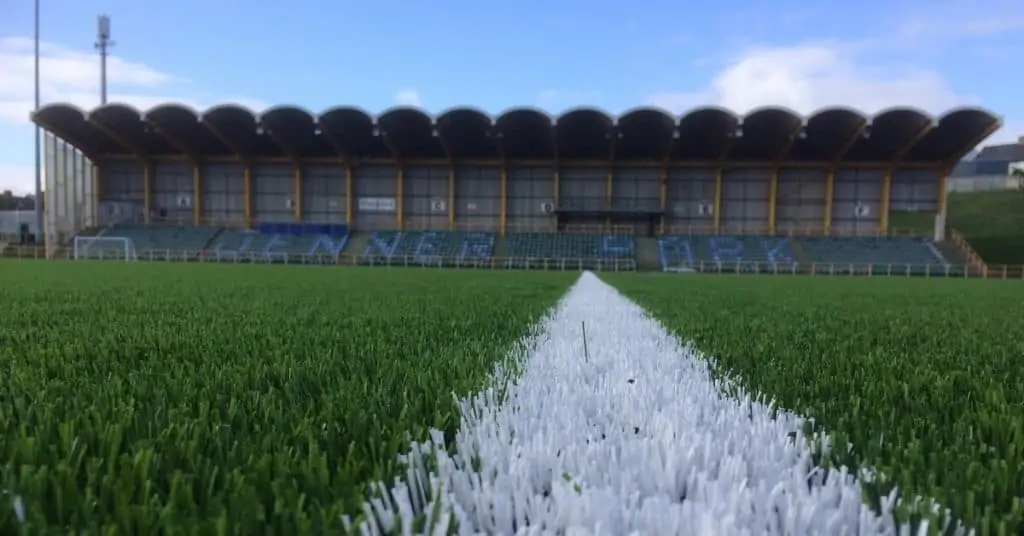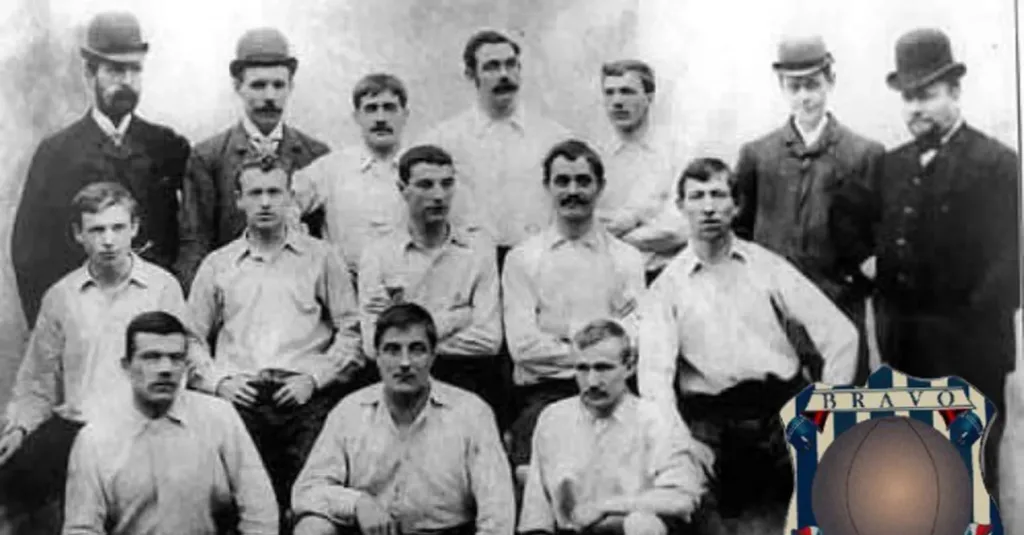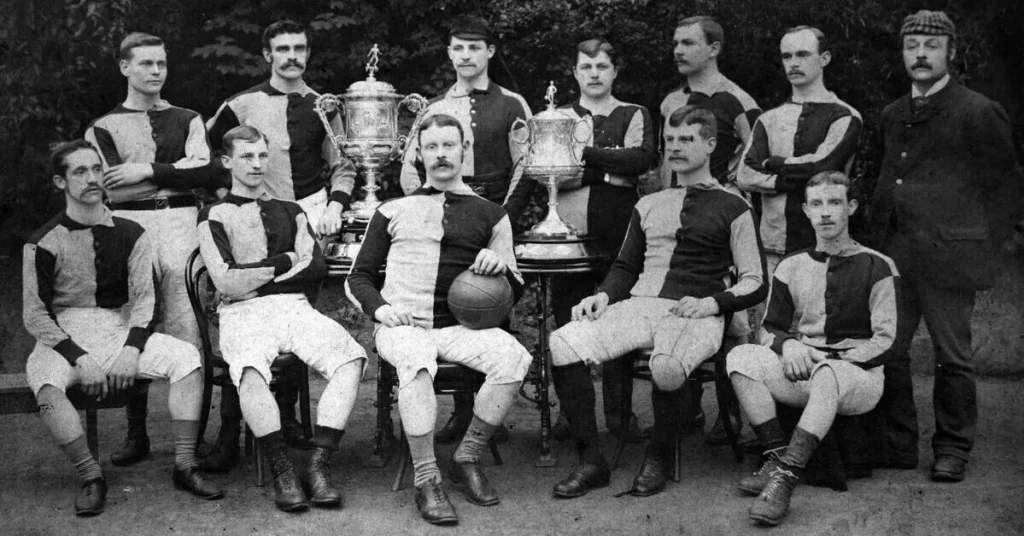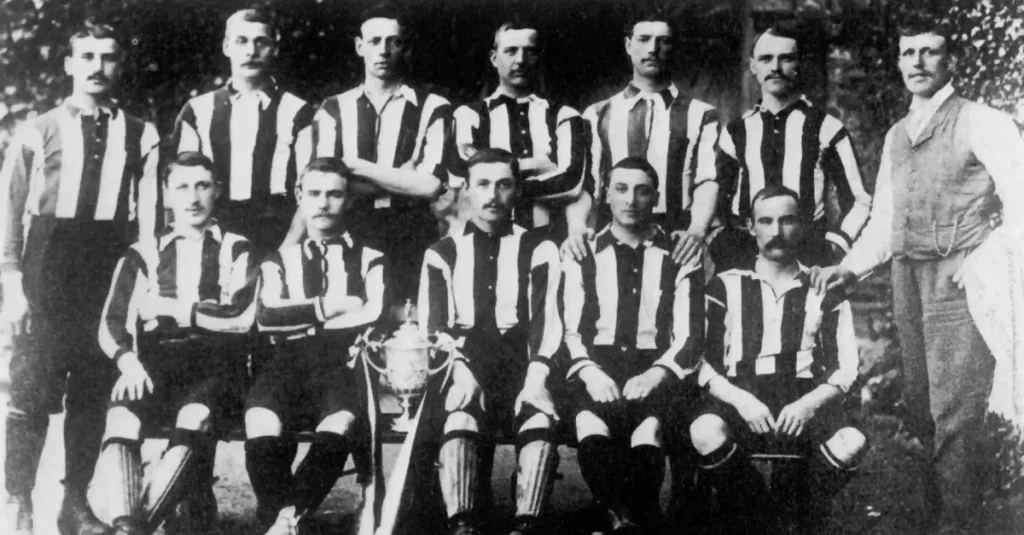Barry Town FC, a semi-professional association football club based in Barry, Wales, has been making waves in the sport since 1892. Known for being a winner of the Welsh Cup and Cymru Premier in the 90s and early 2000s, the club has also represented Wales in Europe.
With a history that includes competition in England’s Southern League and FA Cup, they call Jenner Park in Barry home and play to a crowd of 3,500. A pioneer in the sport, Barry Town FC was the first British club to bring in players from Europe during the late 1950s and early 1960s.
Before Overseas Players
The British domestic game now attracts stars from all over the world. This has all been made possible firstly by the free movement of labor available to players following the UK’s entry into the Common Market in 1973 and more recently by the development of regulations to allow non-EU players to play here on work permits.
Pre-1973 there was, of course, no such freedom of movement. The internal labor market within the UK saw teams regularly recruit from across the four Home Nations and the Republic of Ireland.
It was almost impossible for players from outside the British Isles to sign for senior professional clubs unless they played as an amateur until they had completed the lengthy residence period required to sign a professional contract.
Southern League clubs were not subject to the same salary restrictions as Football League clubs in the post-war period. So essentially, they could pay their players what they wanted.
Recruiting Overseas Players
Barry Town FC recruited a string of European international stars in a desperate bid to avoid relegation would probably attract very little attention from the media today. Even if one of those stars had appeared in the World Cup finals just months previously.
As attendances fell during the 1950s, many soccer clubs experienced financial problems. However, towards the end of the decade, the position had improved significantly in many cases.
The development of vibrant supporters’ clubs running what were often lucrative pools’ competitions led to financial stability and a renewed surge in wages for the top players. By the end of the 1950s, star players would often earn more money playing in the Southern League than they could in the Football League.
As an example, Chelmsford City was close to leaving the Southern League at the end of the 1954-55 season. The supporters’ club’s football pools competition was reorganized, almost immediately increasing the weekly profits from £65 a week to over £200 a week.
By 1959-60, annual donations to the parent club were running more than £13,000. However, many Football League clubs did not reach this figure. For example, at Port Vale, the fans donated £10,352 during the same season. At Lincoln City, then in the old Second Division, the total was just £2,250.
John Bailey
Barry Town FC had struggled in the early post-war years. So when gates dipped below the 2,000 mark in 1949-50, they were forced to seek financial support from a mysterious ‘Mr. X’, eventually revealed to be local businessman John Bailey.
Bailey, who was in his mid-20s, had been privately educated at Radley College before studying at Loughborough Engineering College. However, John Bailey pulled off what was a fantastic coup with the signing of Bengt Berndtsson, a gifted inside-forward for IFK Göteborg. Berndtsson was an established international for Sweden, having made his debut against England in May 1956.
A director of the family firm of ship repairers, CH Bailey Ltd, John Bailey had business interests in Scandinavia through an association with Jacobsen Shipping. From 1959, the Bailey family also took over the former Royal Navy dry dock in Malta in what appears to be a very early example of privatization.
Having purchased £500 worth of shares to stabilize the club’s financial position in the early 1950s, John Bailey helped guide the team to victory in the Welsh Cup final over Chester in 1955.
He was now chairman of the club, a position he held until his death in 1982. However, from the mid-1950s onwards, Barry Town FC began to struggle very severely as gates fell to around the 1,000 mark and relations with the supporters’ club were at something of a low ebb.
It was against this background that John Bailey started to use his business contacts across Europe to recruit a better quality of player. As he noted to the Barry & District News football correspondent: “We can go only to Europe for new players. English stars are far too expensive for a club like ours.” While Barry Town FC was free to recruit amateur players, they would not be able to sign any players as professionals.
The new policy of recruiting from Europe first drew the attention of the Barry & District News on 31 July 1958. There was speculation that the club was about to sign two players in what was to become a familiar pattern.
Sven Lindberg, a goalkeeper who made several appearances for Midland League club Peterborough United in 1957-58, and Karl Lindberg, an inside-forward with IFK Stockholm, a club in the second tier of Swedish soccer.
In October, with the season in Sweden now having ended, two amateur players attached to IFK Stockholm arrived in South Wales. Ingvar Ake Andersson, a 23-year-old bricklayer, and Karl Erik Lindberg, also 23 and described as a bookbinder by profession.
There was no great transformation in the team’s fortunes – Barry Town FC lost 5-0 at Worcester on Lindberg’s debut. However, by the end of the year, both had returned to Sweden. Andersson was due to undergo a course of military training. At the same time, Lindberg returned to resume his bandy career, a sport best described as a combination of soccer and ice hockey played on an outdoor ice rink.
In the meantime goalkeeper, Sven Lindberg had arrived at the club. It transpired he was a salesman in a large store in Stockholm and had taken leave to play for Barry Town FC. There was further speculation in January 1959 that John Bailey might bring a player named Pablo Ricardo over from Northern Spain, but nothing came of this.
Bengt Berndtsson
However, in February, John Bailey pulled off what was a fantastic coup with the signing of Bengt Berndtsson, the gifted inside-forward for IFK Göteborg. Bengt Berndtsson was a regular choice for Sweden when he arrived in Barry Town FC and played in all seven internationals in 1959.
Berndtsson, like his fellow Swedes, was able to play because this was the close season in Scandinavia. Described as a shipyard worker in Göteborg who was looking for similar work locally, it is possible that he was employed by one of the Baileys companies during his stay.
His debut against Wellington Town on 21 February attracted a gate of 1,500. Almost double that of the previous home game. The Barry & District News reporter noted, “Berndtsson certainly showed clever and deft touches with a powerful turn of speed.” Berndtsson played every game before his departure in early April, helping round the club’s fortunes as the team won seven of the 12 Southern League games he played in, including a 7-1 home victory over Kettering Town.
John Bailey seems to have become convinced that Europe was the place to find players. Over the summer of 1959, Barry Town FC was linked to numerous players, including Lazio’s Italian internationals Luigi Moltrasio and Roberto Lovati. They also moentioned four more Swedish internationals: Bengt Salomonsson (IFK Helsingborgs), Pravitz Öberg (Malmo FF), Bengt Nyholm (IFK Norkopping), and Sigge Parling (Djurgardens IF). Of these names, only Bengt Salomonsson eventually signed for the Jenner Park club.
In the autumn of 1959, Barry Town supporters organized a coach to Wembley where they saw Berndtsson and Salomonsson help Sweden to a 3-2 win over England.
Despite much press speculation, it was not until the Scandinavian season ended that players began to arrive. Salomonsson was accompanied by Björn Löwenburg, a Sweden U21 international soccer full-back from FF Malmö, and two internationals from Finland, both from HIFK Helsinki: Rolf Rosqvist and Hannu Kankkonen.
Barry Town FC Turmoil
Barry Town FC was in some turmoil at the turn of the year, with manager Harry Haslam having departed for Tunbridge Wells. His replacement was Albert Gardner, said to be a full-time worker in the dockyard.When they visited Wisbech Town, the team was bottom of the Southern League Premier Division table by early January.
Despite fielding three full internationals (Rosqvist, Salomonsson and Kankkonen) they lost 3-1. Rosqvist returned to Finland soon afterward to be replaced by another international, Stig Holmqvist.
In total, Barry fielded five European players in their Southern League games during 1959-60. The four internationals plus another IFK Stockholm player, Lars Eklund. Ingvar Eklow and, somewhat bizarrely, Björn Löwenburg only played for the reserves in their Welsh League fixtures.
There was a significant upturn in the team’s fortunes from January, and seven of the last 11 home games were won. It was enough to lift them off the bottom of the table but not enough to avoid relegation from the Southern League Premier Division.
The 1960-61 season saw Barry Town FC playing in the First Division of the Southern League. Although not so prolifically, they continued to recruit from Europe and target players who were less well known.
On 8 September 1960, the Barry & District News announced: “The first of this season’s quota of foreign players arrived at Jenner Park during the week. He is Isadora Lafita, a 25-years-old Spaniard who has come to Wales to study English at college.”
Lafita, from Sestao Sports, was a regular in the side throughout the season, being joined later by his fellow countryman José Arriola and, briefly, Bengt Cylinder from IFK Stockholm. As a result, the team reached a comfortable mid-table, placing under new manager Bob Kelly the former Burnley player.
Nevertheless, the club was experiencing more financial problems. The team captain Ted Loader reportedly refused to travel for the away game at Bexleyheath after cuts in the players’ wages were announced.
Berndtsson Returns
The return of Bengt Berndtsson in March provided a lift to the club, but just 600 spectators turned out for his first home game. His stay was only a brief one.
Chairman John Bailey took the team on a summer tour of Malta, but this was more or less the end of Barry’s flirtation with Europe. Jose Arriola returned for a final season at Jenner Park in 1961- 62, and a final Scandinavian, named Ilka Haila, made a very brief appearance.
Bailey severed his contacts with the family firm in the mid-1960s and went to live in London. However, he retained the chairmanship of the Barry Town FC until his death in December 1982. He was also involved with Newport County as a director from March 1962 to December 1967. He also served on the FA of Wales Council during the 1960s.
Barry Town FC recruited 15 players from Europe over four years. Nine players from Sweden, four from Finland, and two from Spain. Of these, five were full internationals: Berndtsson, Salomonsson, Rosqvist, Kankkonen and Holmqvist.
Most players only stayed a few weeks, and although some provided a boost to the team’s performances, the overall effect was minimal. Despite the presence of seven Europeans on the club’s books (including four full ‘caps’), the team was relegated from the Southern League Premier Division in 1959-60.
In hindsight, the board might have been better advised to repair relations with the supporters’ club, build up their football pools competition. Then use the extra income to attract a better quality of domestic players on a more permanent basis.
Nevertheless, Barry Town FC supporters were left with some beautiful memories, particularly of Bengt Berndtsson, fondly remembered in South Wales when he passed away in June 2015.
Interesting Facts About Barry Town FC
- Bobby Smith played for Barry Town FC for 20 years, playing over 500 games for his beloved club.
- Barry defeated Dagenham Town 1–0 at Upton Park in 1929 to reach the FA Cup 2nd Round.
- Jenner Park was constructed ahead of the team’s first match of the 1912–13 season on land owned by the Jenner family.
- The origin of the official’s kit is believed to have come from Plymouth Argyle and for many decades, green served as their predominant hue.
- During three stints with Barry Town FC, Fred Whitlow scored 100+ goals and accumulated 13 hat-tricks.
- For the first time in this club’s history, they took part in a European competition in 1996.
- Making history in 2001, Barry Town FC became the trailblazer for the League of Wales (now Welsh Premier League) by becoming the first team to win a European Champions League match. They achieved this feat by defeating Azerbaijan’s champions FC Shamkir, paving the way for a showdown with FC Porto.
- During the 1920–21 season, Barry shocked many by winning the Southern League’s Welsh section. It was an impressive achievement, especially since Barry played more than 100 games in all competitions during the season.
- In 230 appearances, Steve Williams scored 160 goals.
- A total of 32 players have represented Wales.
- Mason served as a POW during World War II and still played over 400 matches for Barry Town FC on either side of the war.
- In 1949–50, Jenner Park blazed a trail as one of the earliest stadiums in the nation to feature floodlights.
- In the 1995/96 season, after just one year in the League of Wales, Barry made history as the league’s inaugural fully professional soccer club.
References:
[1]: https://en.wikipedia.org/wiki/Barry_Town_United_F.C.
Images:
www.mcardlesport.co.uk/case-studies/jenner-park/ (main image)





